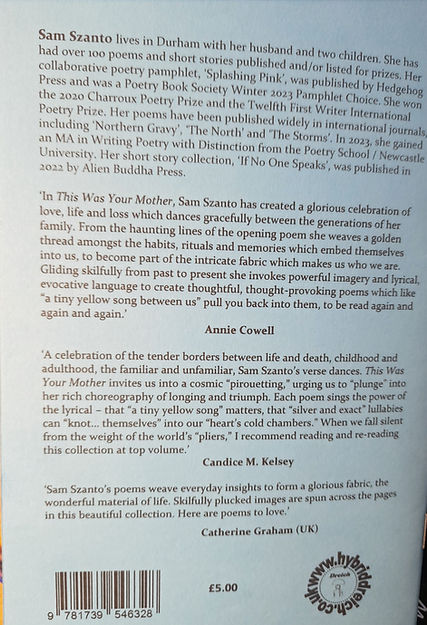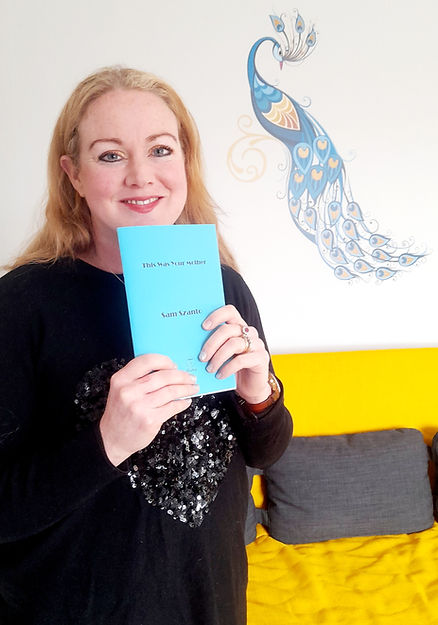Amy Lilwall: "The fun starts when you have a full draft and the editing begins. It’s like building a house, then placing the furniture inside it."
- samszanto2
- Sep 12, 2025
- 8 min read

A chat with Amy Lilwall about her book, The Water That May Come (Fly on the Wall Press, 2025)
How would you describe The Water That May Come in one sentence?
The Water That May Come is a book about relationships against a backdrop of natural disaster.
How did you come up with the title?
Good question! It was originally a placeholder title that just stuck. After a while, I got used to the title and so it didn’t really occur to me to change it. It’s never really made explicit in the story if the water does eventually come, and this was an important part of the forces at play in the background, to me. Should we believe everything we are told? How can fabrication be used to control? Ultimately, my editor didn’t ask me to change the title – which could very easily have happened – so it stayed!

What was the inspiration for the book?
Lots of different things, actually. The natural disaster threatening the UK is based around an old theory that if the volcano, Cumbre Vieja in La Palma, erupts in a certain way, it could cause a devastating tsunami that would cover Western Europe and parts of the UK. I heard about the theory of the volcano when I was a child, and I always wanted to write a story about it (in fact, I started to write one when I was about twelve – I don’t know what happened to that draft…).
Originally, the novel had a larger cast of characters, because I wanted to experiment with a variety of character arcs. As the project developed, however, I found that my characters wouldn’t be bent into a fixed shape; furthermore I realised that I wanted to prioritise the idea of inverting the immigration crisis, which brings me to the real inspiration for this story (although I didn’t realise this until I had written a full draft).
I was working with an Eritrean colleague in Kent. They told me of their journey to the UK. The details were shocking and they lost someone close to them who undertook the same journey. It was clear that they were simply looking for a better life, but they’d suffered irreparable, unnecessary trauma in order to access it. Now they faced a fractured life without their family and, due to their immigration status, they were continually obliged to hide or justify their existence in the UK. The conversation made me realise how desensitized many British citizens are to the media coverage of immigration.
I exhumed my long forgotten ‘volcano idea’ and used it as the reason why UK citizens would have to flee a country that was no longer safe to live in. Then I added a chilling complication to the immigration process. In order to speak to contemporary issues of climate change, I tweaked the theory slightly. I invented a fictional volcano in Iceland, and considered the idea that temperature changes and melting glacial weight could interfere with the pressure in the magma chamber and lead to an eruption. This is entirely possible, but the ensuing water displacement and megatsunami – certainly one that reaches as far as it does in the book – relies on a bit of poetic license.
Would you say the book has a theme?
I think the book has many themes. Relationships is certainly one of them, specifically how they can be forced, manipulated and tested. Also, the concept of borders lingers in the background. In reality, many people have to live through unspeakable journeys and events in order to achieve some sort of peace and freedom, but the difference between them and, say, your average UK citizen, is merely a question of geographical boundaries. I really wanted to interrogate the idea that a relatively ‘privileged’ (and I use that word carefully – obviously this doesn’t apply to all UK citizens) nation could be forced to evacuate, and the rest of the world wouldn’t necessarily care. Or rather, the rest of the world would like to care, but is desensitized, or only concerned about how an influx of people might negatively impact their own lives.
How did you structure the pieces in the book?
This book has been through multiple iterations. It started life, back in 2018, as a massive, massive story with loads of main characters all living through this pending natural disaster. As I’ve already mentioned, I wanted to create something quite high concept, with each character living through a very specific plot structure. Ultimately, it got too messy and unwieldly, so I cut it in half. This novel is the first half. I tried to develop the characters’ perspectives as best I could, and set about deepening their experiences and expanding upon their relationships to each other. I like reading multi-perspective narratives, and I believe they are much easier to write. Trying to sustain a novel-length story through one perspective is hard, in my opinion.
If you could get a blurb from anyone, living or dead, for the book, who would it be?
Probably the Margaret Atwood. That would be absurdly cool.
How did you decide on a publisher?
It’s nice to think that I decided on a publisher; it would probably be more accurate to say that the publisher decided on me! Fly On The Wall is a publisher with a conscience that specialises in political fiction – so this seemed like a good match for my own novel. I had submitted something to Isabelle Kenyon (the Managing Director) in the past, and she replied promptly with a very kind rejection email. Many writers will agree that it is wonderful to receive any kind of correspondence following a submission, let alone within a speedy timeframe. I always remembered this email because it was such an unusual occurrence. A couple of years later, Isabelle and her team won Small Press of the Year in the North, and it occurred to me that this person was really making waves in the literary world. I thought that she would be a great person to work with, so you can imagine how thrilled I was to have my manuscript accepted.
How long did the book take to write?
From idea to publication, probably about seven years. Quite a long time. And I have lost count of the number of times I’ve read it from cover to cover – that’s all part of the editing process.
What’s your writing process? i.e., do you work at a particular time of day / in a particular place? Do you need silence or can you work in a café?
I write when I have to, usually. That means, if I am working on a project, I have to finish it, so this will necessitate a burst of sustained effort. I don’t have any half-finished novel manuscripts (and I have written a few!). I often work in the morning – before the day gets in the way – and often during the summer, when I’m not teaching. I can usually work with café background noise, but at home I have to write in silence. I think this is maybe because ‘home noise’ often requires my attention, and so I find it distracting. Part of my process is to meet word-count goals. Between five-hundred and a thousand words a day equates to a minimum of about fifteen-thousand words a month, so I can usually finish a draft manuscript in about four months. Writing the first draft is a bit of a slog; I’ve always thought that the fun starts when you have a full draft and the editing begins. It’s like building a house, then placing the furniture inside it. It’s satisfying.
How’s the book similar or different to what you’ve written before?
My first novel, The Biggerers, imagines a world in which big people keep little people as pets. Like The Water That May Come, it looks specifically at relationships, power imbalance and freedom. The little, cloned beings are small and mute, but still human, yet they are considered inferior. The Water That May Come addresses social hierarchy, and the freedom that comes with wealth and status. Come to think of it, there are quite a few similarities. I often think, however, that my short stories and novels start with a question or premise. What would the world look like if small people were kept as pets? Is it possible that a middle-aged man could still believe in Santa Claus? What would happen if a volcano threatened to engulf the UK? From these questions, the story gradually unfolds.
Have you any readings or other events planned to promote the book?
Yes! There’s quite a lot going on before Christmas. We have the launch at Lark Books in Lincoln, during Lincoln Literary Festival, on the 3rd October – all are welcome! I’ve also been invited to some wonderful bookshops in Manchester, Chester and Newcastle so do look out for more information on my website.
I believe you teach creative writing? How does your teaching benefit your writing and vice versa?
I do, yes! I go back and forth on this – I think that having the opportunity to work with creative people, and read their work, has made me value and respect art and writing more than I would have done in a previous life. Many people tend to relegate their writing to the category of ‘hobby’, or are hesitant to call themselves writers because it’s not the thing they do all day, every day. Teaching Creative Writing, and being with students who are really, really passionate about what they are doing, quells any notion that writing isn’t real life. On the flip side, it has made me super critical of my own work. I really thought that teaching writing would make me a better writer and make my voice wonderfully consistent and strong. Turns out, this isn’t the case. I tend to write something, then hate it when I read over it the next day. Then the following day I’ll like it again. I basically find it hard to tell if what I’m writing is good, yet it’s something that I feel very confident about when assessing student work. I wonder if other teachers of Creative Writing can relate!
I love the book club questions. I’d like to ask for your own answers to them, but as there’s not the space for that, could you tell me whether you wrote the questions? And, are you in a book club and if so, what was the last book you read in it?
I love the book club questions too. I think they are a fabulous idea, and have been very carefully devised by someone who has read the novel enthusiastically and meticulously. I’m afraid to say that it wasn’t me. These excellent questions were written by my editor; funnily enough, they have made me think about the story differently. It’s so nice when other people bring their own questions and interpretations to your work; it goes to show that bringing a story to life requires a collaboration of imaginations. I have intended to be part of a book club for the past I-don’t-know-how-many years, but because I do so much reading for my job, I haven’t quite found the time to squeeze in another, regular, novel-length read. This is a poor excuse – and I must try harder. For what it’s worth, the last book I read was Before The Coffee Gets Cold by Toshikazu Kawaguchi. It’s amazing. If you haven’t read it, I highly recommend.
Buy The Water That May Come here:










Comments